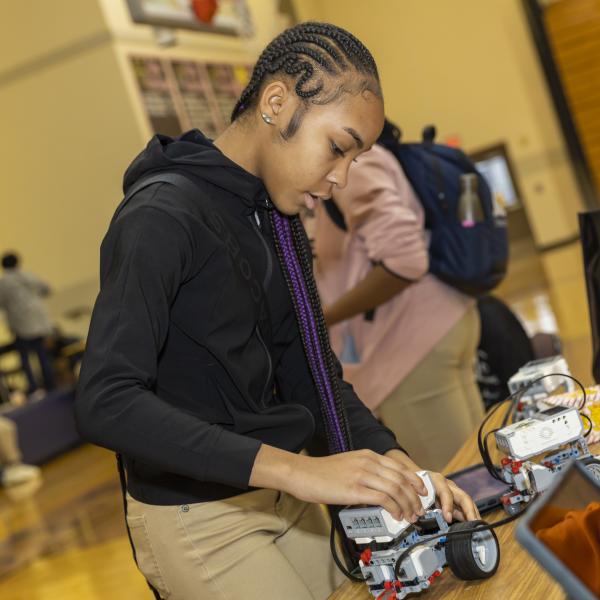Constellations Leading Initiative to Equip High School Students With Vital Computing Skills
Constellations Leading Initiative to Equip High School Students With Vital Computing Skills
Whether they’re interested in auto mechanics, zoology, or something in between, high school students entering the labor force over the next decade will need basic computing skills to succeed.
“Computer science is everywhere. Being able to excel in computational thinking is important at every age. Making sure that we are offering students what will make them better humans is just as important,” said Deirdre Pierce, a computer science teacher with Decatur City Schools.
Pierce was one of several metro Atlanta school district representatives who recently participated in a meeting hosted by Georgia Tech to discuss an initiative to expand access to computer science (CS) education.
Georgia Tech’s Constellations Center for Equity in Computing hosted the meeting with seven metro Atlanta school districts, the Georgia Department of Education, and others. The meeting was part of ongoing efforts to ensure all secondary education students have the resources to build their computing skills and computational knowledge.
The school districts participating were Clayton, Cobb, DeKalb, Fulton, and Gwinnett counties, Atlanta Public Schools, and Decatur City Schools. Teachers and career, technical, and agricultural education representatives from these districts convened to explore how to effectively integrate computer science into their curricula.
Constellations Senior Research Fellow Bryan Cox and Allison Scott, CEO of the Kapor Center, led the meeting. Kapor is a California-based nonprofit organization that provides philanthropic support for Constellations.
"Providing robust computer science education to all students, regardless of their background, is crucial for creating a diverse and innovative tech workforce," said Scott, highlighting the importance of equitable access to CS education.
"Research underscores the need for comprehensive support systems to ensure the successful implementation of computer science programs in schools," said Cox.
The discussion centered around identifying each district’s needs and how Constellations and Kapor could support their efforts. Topics included professional development for teachers, curriculum resources, and strategies for engaging students from underrepresented communities.
“People in this space are passionate about removing barriers to access high-quality and inclusive computer science education. However, I think there are some real systemic issues to address for us to do that. So, I’m curious to see the long-term impact of addressing these systemic issues,” said Sally Holloway, Gwinnett County Public Schools director of artificial intelligence and computer science.
To help address the systemic issues, the participants agreed that creating community among the school districts will be essential to their success. The discussions focused on finding ways for districts to support one another and create equitable pedagogy for CS education across the Atlanta metro area.
Cox says this initiative reflects a broader trend of integrating CS into K-12 education to prepare students for the demands of the 21st-century workforce.
“This program marks a significant step forward in ensuring that students from all backgrounds can access computer science equitably, paving the way for a more inclusive and innovative future,” said Cox.
The meeting featured key figures such as Allison Scott, CEO of Kapor, and Bryan Cox, the Kapor senior research fellow at the Constellations Center for Equity in Computing.
Photo credit Terence Rushin/ College of Computing
